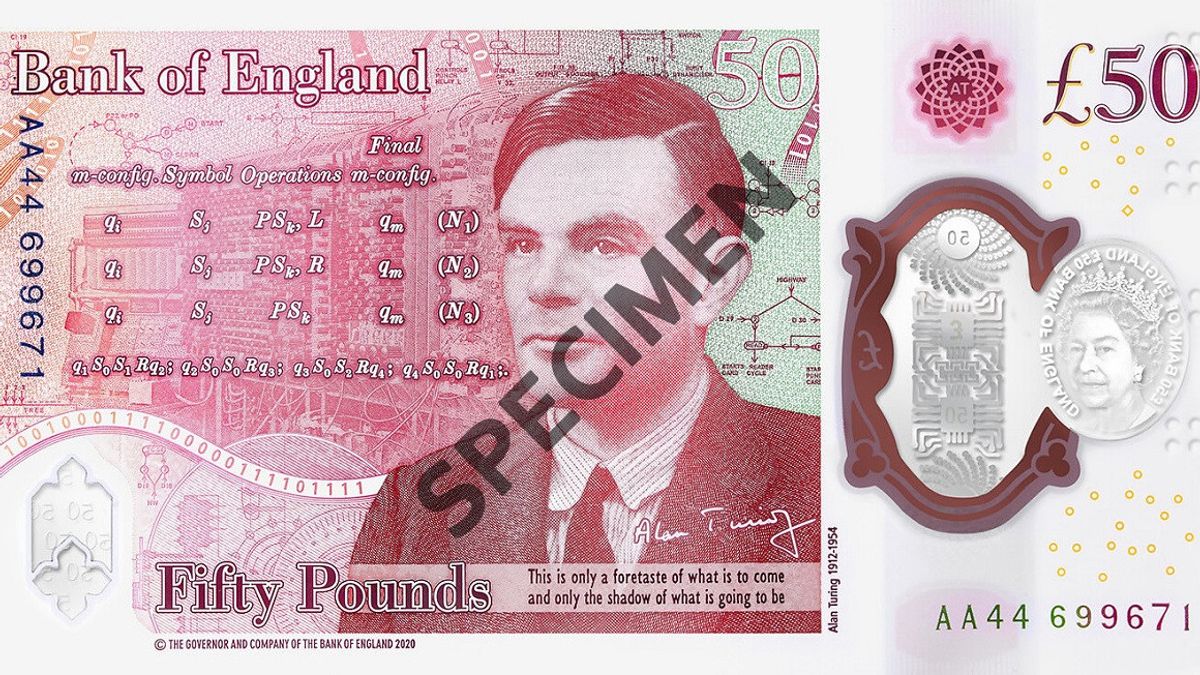JAKARTA - Britain's financial authorities officially circulated the new £50 note on Wednesday 23 June, after being launched for the first time three months ago.
What's interesting about this new money, the Bank of England (BoE) features mathematician and computer scientist Alan Turing, one of the historical figures as well as controversy in British history.
Turing is best known in England for designing a machine to decrypt coded messages during World War II. Before the war, his work laid the theoretical foundations for modern computer science, as well as made discoveries in developmental biology.
"Putting him on this new banknote is a recognition of his contribution to our society, and a celebration of his extraordinary life," said BoE Governor Andrew Bailey.
The new money made of polymer will complete the BoE's transition from paper money. The BoE said the 50 pound note would remain valid until the end of September 2022.
BoE data, the 50 pound note accounted for 357 million of the approximately 4.5 billion banknotes circulated by the BoE.

It is not without reason that Turing's drawing in this new fraction was accompanied by a mathematical formula he wrote in 1936 and became the basis of modern computer science, as well as technical drawings of machines to decode Enigma.
Not to forget, the money also features Turing's famous quote on machine intelligence, "This is only a foretaste of what is to come, and only a foreshadowing of what is to come."
One of his services to Britain and possibly the world, Turing discovered he was able to crack the Nazi Enigma code. Thanks to this ability, he was able to crack Nazi Naval communications, ensured Allied convoys of ships avoided German U-boats and were important in the Battle of the Atlantic. He also developed techniques that led to the more sophisticated decryption of the German Lorenz cipher.
However, Turing was convicted of gross indecency in 1952, for having sex with a man and undergoing chemical castration by injection of female hormones, to avoid a prison sentence. He also lost his security clearance to work with Britain's GCHQ intelligence agency. The reason? Homosexuality was still illegal in the UK until 1967.

Turing, who chose to commit suicide using cyanide in 1954 at the age of 41, received a pardon issued by Queen Elizabeth in 2013 for the criminal convictions that preceded his death.
"He was also gay, and as a result was mistreated. By placing him on the new 50-pound polymer banknote, we celebrate his accomplishments and the values he symbolizes," Bailey said.
The honor is also given by GCHQ. Jeremy Fleming, the agency's head, said Turing's picture on the record was an important moment.
"Turing was embraced for his brilliance and persecuted for being gay. His legacy is a reminder of the value of embracing all aspects of diversity, but also of the work we still need to do to be truly inclusive," said Fleming.
As a tribute, GCHQ installed a giant 10 x 10 meter colorful piece of art in the center of their base, in the shape of a donut depicting Turing inside the wheel of the 'bomb' code-breaking machine he designed.
To note, Turing joined the Government Code & Cypher School, the predecessor of GCHQ, in 1939 to help crack the German code. With the help of Poland, he broke the Naval Enigma. He left GCHQ in 1945.
GCHQ is the UK's largest spy agency. His job is to eavesdrop on the world to protect Britain's security, although it also interferes with communications.
The English, Chinese, Japanese, Arabic, and French versions are automatically generated by the AI. So there may still be inaccuracies in translating, please always see Indonesian as our main language. (system supported by DigitalSiber.id)












